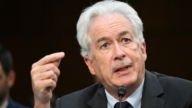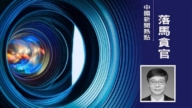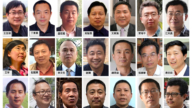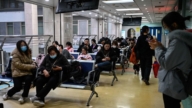【新唐人2012年8月17日訊】中國一發生重大事件或重大話題,中共機關報《人民日報》就立即刊發「本報評論員」的署名文章,予以解讀和評論,引導輿論,這些神秘的評論員名字背後,蘊藏著獨特的政治密碼。但是,學者認為,雖然中共喉舌還時不時的根據形勢,要引導輿論,可是人們已經覺醒,中共媒體的評論文章起不到多大作用了。
中共執政至今,重大決策通常在第一時間通過《人民日報》傳播到全國。而《人民日報》的評論也有絕對的權威性,成為外國解讀中國政治的風向標,也成為國內各界判斷時局的重要參考。
香港《大公網》8月15號,對《人民日報》評論文章作者的「筆名」做了研究和解讀,分析出:一般針對重大事件或者重大話題,多署名「本報評論員」。主要是根據諧音取筆名,比較著名的像「任仲平」,就是「 人民日報重要評論」的諧音;而「國紀平」則是「國際重要評論」;「鐘聲」為 「中國之聲」的諧音縮寫;「仲祖文」是「中共中央組織部文章」的意思。
另外,在一些關鍵的歷史節點前後,也有使用特殊筆名的文章出現,如曾經在90年代初蜚聲國內外的「皇甫平」。「皇甫平」——實際是「在黃浦江輔佐鄧小平」的意思。這個筆名為鄧小平的觀點搖旗吶喊,他的觀點也引起了廣泛的討論和論戰。
《北京之春》雜誌主編胡平:「把它分類就是,一種就是真正的筆名,甚麼『皇甫平』就是筆名。一種就是甚麼評論員,評論員、特別評論員都是筆名嗎。另外一種就是看上去像筆名,其實他是諧音,他就直截了當告訴他是哪個部門、哪個單位。」
胡平認為,中共評論文章中,具體作者是誰根本不重要,代表哪個單位才最重要。當然,以個人筆名發表文章的評論員,也是經過某一級授意的。
原《河北人民廣播電臺》編輯、大陸自由撰稿人朱欣欣認為,個人代表官方觀點寫評論文章更像是中共宣傳的需要。但是,作者本人很膽虛,一般不敢使用自己的真名。
原《河北人民廣播電臺》編輯 朱欣欣: 「以官方組織的名義發表文章這不方便,顯得也很不正規,他又明白大家都懂得潛規則。 另一方面,說明官方還有一種很虛偽的需要,他又是要假扮成似乎有一個作者,又代表個人觀點,實際上代表官方組織的一個觀點。」
有時《人民日報》「評論員」,代表的級別更高。如2010年10月末,《人民日報》以「鄭青原」筆名,連續刊發五篇評論,內容更涉及「政改」等敏感話題。有分析指出,「鄭青原」取「正本清源」的諧音,這是比「仲祖文」、「任仲平」更高級別的諧音,是政治局級別的輿論導向。
大陸資深傳媒人高瑜指出,中共非常重視宣傳,毛澤東為引導輿論,為《人民日報》寫過很多社論,「反右」時,還當過《人民日報》總編輯,向右派開火的很多文章就是他寫的。《人民日報》在宣傳中共的方針政策,起到了絕對的「喉舌」作用。
不過,高瑜認為,人們目前已經覺醒,「喉舌」已經起不到太大作用了,群眾不僅不看,還在微博、博客等媒體上,對中共的宣傳進行針鋒相對的反駁。
大陸資深傳媒人 高瑜5:20——5:52「(民眾)整個和這些甚麼『鄭青原、任仲平』和這些對著幹,所以,弄得他們現在是非常頭疼,嚴管輿論!而且是…中央現在對整個的形勢的分析,你別看表面是冠冕堂皇,實際上他們分析的是很嚴重的,國內外的形勢他們認為都不利。」
高瑜表示,中共為應對危機,一是用武力控制社會群體事件,二是在意識形態控制老百姓不讓講話,時不時的發一些嚇人的評論,但人們已經不怕了。
採訪/朱智善 編輯/宋風 後製/肖顏
CCP’s Political Cypher of Pen Names
China’s major events or topics are always commented on
by the People’s Daily, an official mouthpiece of the Chinese Communist Party (CCP).
The paper’s commentaries are usually authored
by “The paper’s commentator,” guiding the public opinion.
The pen names of the People’s Daily’ review articles
hide CCP’s political cypher.
Scholars remarked that as the Chinese have awakened,
the CCP’s official commentaries no longer matter much.
The People’s Daily serves as the major media
that spreads the CCP’s key decisions across China.
Its’ commentaries are deemed a political weathervane
for the West to interpret China’s politics,
and important references for the Chinese
to judge the political situation.
On August 15, Hong Kong’s Takungpao.com analyzed
the “pen names" of the People’s Daily’s review articles.
It said, the commentaries on major events or major topics
are usually authored by “the paper’s commentator.”
His pen names are mainly homophones. Such as
“Ren Zhongping," a homophone of “the important review of the People’s Daily.”
“Guo Jiping,” “the critical review on international issue;"
“Zhong Sheng," the “Voice of China;"
“Zhong Zuwen,” “the article issued by the CCP’s
Central Committee Organization Department."
Some special pen names were related
to important historic events.
Like “Huang Fuping,” a well-known name in China
and abroad in the early 1990s.
It actually means,
“assisting Deng Xiaoping in Huangpu River.”
The penname advocated for Deng’s views,
having aroused extensive discussions and debates.
Hu Ping (chief editor, Beijing Spring magazine): “Its pen
name classification includes true pseudonyms like 『Huang Fuping;』
commentators or special commentator; and homophone
pen name, which indicates the department that expresses the article’s view.”
Hu Ping said, for the CCP’s review articles,
the true author is beside the point.
Its importance lies in which department it represents.
Hu Ping disclosed that any commentary issued under
a pseudonym was actually requested by the authorities.
Zhu Xinxin, editor of Hebei People’s Radio Station, said that
pen names in official commentaries are more likely to meet the need of the CCP』s propaganda.
The author is generally timid,
and dare not use his real name.
Zhu Xinxin: “It’s not convenient and proper for the regime
to publish its views in the name of some official sector.
But it knows that the public understand the unspoken rules.
Also, this shows the hypocritical side of the authorities.
It pretends to have an author who expresses his personal
point of view, but actually he is a voice of the regime."
Sometimes the pen name of “commentator”
implies a higher ranking.
For example, in late October 2010, the People’s Daily
released five commentaries authored by “Zheng Qingyuan.”
The review articles talked about “political reform"
and other sensitive topics.
Analysts say that “Zheng Qingyuan” is a homophone
of “clearing up the origin," a higher-level than “Zhong Zuwen," and “Ren Zhongping.”
It was considered to represent
the view of the CCP’s Politburo.
China’s media veteran Gao Yu remarks that the CCP
attaches great importance to its propaganda.
Such as Mao Zedong, who wrote many editorials
for the People’s Daily to guide public opinion.
During the “anti-rightist" movement, Mao, then chief editor
of People’s Daily, wrote many articles attacking the rightists.
People’s Daily has absolutely served as “mouthpiece"
in propagating CCP’s principles and policies, adds Gao Yu.
Gao Yu says that the public in China has awakened now.
Thus the “mouthpiece" cannot do much any more.
The public not only refuses to read official newspapers,
but refutes the CCP’s views on the internet.
Gao Yu: “The views touted by these official critics
have been attacked (by the public,) so the authorities tightened control over the public opinion!
The official analyses of the situation looks high-sounding,
but very serious in fact.
They have realized the situation, at home and abroad,
is against them."
Gao Yu comments that the CCP uses violence to control
mass protests, and ideological control to muzzle people.
It also issues some threatening commentaries.
However, all these techniques are failing to scare the public.

























